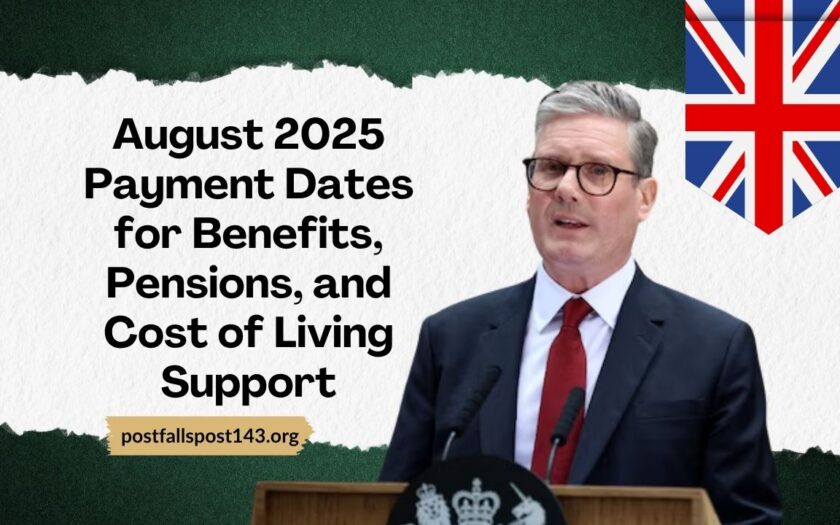Millions of people across the UK are still battling with the high cost of living, as everyday expenses continue to rise faster than household incomes.
A recent report from the Resolution Foundation highlights that while inflation has settled back to pre-pandemic levels, the cost of essential goods and services remains stubbornly elevated. Coupled with stagnant wages, many families are turning to debt just to afford basics like food and utilities.
Soaring Food Insecurity and Energy Debt
In January 2025, approximately 7.3 million adults—or 13.9% of UK households—faced food insecurity, according to The Food Foundation. This troubling figure shows no signs of returning to pre-2022 levels.
Simultaneously, energy arrears have seen a sharp increase, more than doubling in five years to reach £3.9 billion by the end of 2024.
Unclaimed Benefits: A Missed Opportunity
Currently, about 24 million UK residents receive some form of DWP-administered benefit, covering roughly one-third of the population. Despite this, research by Policy in Practice reveals a staggering £23 billion in unclaimed benefits annually.
To find out what you may be entitled to, it’s crucial to use benefit eligibility calculators available online.
Key Benefit Payment Dates – August 2025
Most benefit payments will proceed as usual in August, but there is a bank holiday to consider:
Summer Bank Holiday: Monday, 25 August 2025
Payments scheduled for this date, including Universal Credit and State Pension, will be made on Friday, 22 August.
Benefits Affected Include:
- Universal Credit
- State Pension
- Pension Credit
- Child Benefit
- Disability Living Allowance (DLA)
- Personal Independence Payment (PIP)
- Attendance Allowance
- Carer’s Allowance
- Employment Support Allowance (ESA)
- Income Support
- Jobseeker’s Allowance
Universal Credit Migration Deadline Approaches
The DWP plans to finish moving all recipients of legacy benefits (such as Jobseeker’s Allowance, Income Support, Housing Benefit, and Tax Credits) to Universal Credit by January 2026. Affected individuals should have received notices.
State Pension Payment Schedule for August
State Pension is typically paid every four weeks, with the exact date determined by your National Insurance (NI) number:
| NI Number Ending | Payment Day |
|---|---|
| 00–19 | Monday |
| 20–39 | Tuesday |
| 40–59 | Wednesday |
| 60–79 | Thursday |
| 80–99 | Friday |
Upcoming Increases to Benefit Rates
- In April 2025, most working-age benefits rose by 1.7%, reflecting September 2024’s inflation.
- State Pension increased by 4.1% due to the Triple Lock, adding £472 annually.
- From April 2026, Universal Credit will increase above inflation each year until 2029, starting with a 2.3%+ rise.
- However, the health-related element of Universal Credit for new claimants will be cut from £105 to £50 per month and frozen until 2029.
Additional Financial Assistance Available
1. Budgeting Advance Loans
Available to those on Universal Credit, these interest-free loans are deducted automatically from future benefits.
| Circumstances | Maximum Loan |
|---|---|
| Single | £348 |
| Couple | £464 |
| With Child Benefit | £812 |
Repayment period: Up to 2 years
New rule from April 2025: Deductions will be capped at 15% of the standard allowance (down from 25%).
2. Discretionary Housing Payment (DHP)
Offered by local councils, DHP helps cover rent shortfalls, deposits, and advance payments. You must be receiving Housing Benefit or the housing element of Universal Credit to apply.
3. Household Support Fund (HSF)
HSF offers help with appliances, utilities, and cash grants (up to £300). Each council manages its own fund. Applications are typically online.
- Running until March 2026
- Set to transition into a Crisis and Resilience Fund
4. Charitable Grants
Numerous charities offer financial help for:
- Disabled individuals
- Carers
- Unemployed persons
- Students
- Bereaved families
Search for grants using platforms like Turn2us.
5. Help from Energy Providers
Providers such as British Gas, Octopus, EDF, and E.ON offer hardship assistance. Contact your energy provider to check eligibility.
6. Council Tax Reduction
Depending on your benefits or financial situation, you could qualify for a council tax discount of up to 100%. Local councils may also provide discretionary reductions.
7. Free Childcare Expansion
- 30 hours/week for children aged 3–4
- 15 hours for 2-year-olds since April 2024
- From September 2024: 9+ months old
- From September 2025: All children under 5 eligible for 30 hours
Also available: Tax-Free Childcare (get 20p for every 80p you pay, up to £500/year).
Energy Price Cap Update
From July to September, Ofgem has lowered the energy price cap from £1,849 to £1,720, a 7% reduction. This cap limits how much suppliers can charge per unit on standard tariffs.
Will There Be Another Cost of Living Payment in 2025?
As of now, the DWP has not confirmed any further Cost of Living Payments beyond the final round paid in February 2024.
Support for Mental Health
- Samaritans: 116 123 (Free, 24/7) or email [email protected]
- Mind: Support line at 0300 102 1234
- NHS: Online mental health triage tools
- Scope: Online community for those with disabilities
As the cost of living continues to burden UK households, it is crucial to ensure you’re receiving every financial support available. From benefit increases and advance loans to energy assistance and free childcare, several schemes are in place to help manage your household budget.
With major changes to Universal Credit and pension payments on the horizon, staying informed and proactive can help you better navigate financial uncertainty.
FAQs
When will the next Universal Credit increase take place?
The next Universal Credit increase will occur in April 2026, with a guaranteed above-inflation rise starting at 2.3%.
Can I get help if I’m behind on energy bills?
Yes, many energy providers offer hardship funds or payment plans. Contact your provider directly for more details.
How do I apply for the Discretionary Housing Payment (DHP)?
You must be on Housing Benefit or the housing element of Universal Credit. Applications are handled by your local council.

